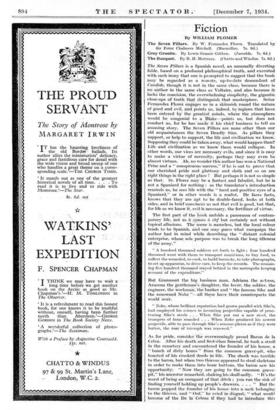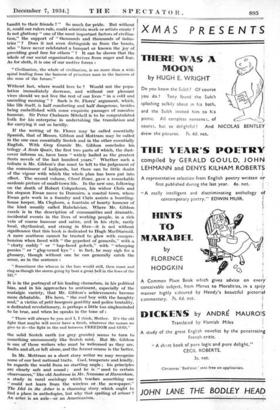Fic Lion
By WILLIAM PLOMER The Seven Pillars is a Spanish novel, an unusually diverting fable, based on a profound philosophical truth, and executed with such irony that one is prompted to suggest that the book may be regarded as a remote, up-to-date descendant of Candide, though it is not in .the same class, because there is no anthor in the same class as Voltaire, and also because it lick:4 the concision, the overwhelming simplicity, the gigantic: close-ups of truth that distinguish that masterpiece. Senor Fernandez Florez engages us in a skirmish round the nature of good and evil, and points us, indeed, to. regions that have been entered by the greatest minds, where the .atmosphere would be congenial to a Blake—points us, but does not conduct us, for he has made it his chief business to tell an amusing story. The Seven Pillars are nixie other than our old acquaintances the .Seven Deadly Sins. As pillars they support, or help to support; the life and civilization we Imow: Supposing they could be taken away, what would happen then? Life and civilization as we 'know them would collapse. In other words, our vices `are necessary evils, and since it is easy to make a virtue of necessity, perhaps they may even be almost virtues. Ah, no Wonder this author has won a National Prize and a " conspicuous "success," if he is out to prove that our cherished pride and gluttony and sloth and so on are right things in the right place 1 Birt perhaps it is not so simple as that. Sr. Florez may be a fantast and fabulist, but he is not a Spaniard for nothing : as the translator's introduction reminds us, he Sees life with the " hard and positive eyes of a Spaniard," or in other Words is a realist. He faces facts, knows that they are apt to be double-fated, looks at both sides, and in brief convinces us not that evil is good, but that, for life as we know it, evil is necessary, the fertilizer of virtue'.
The first part of the book unfolds .a panorama of contem- porary life, not as a :roman a clef but certainly not without ,It: • topical allusion& The scene is namelesS, but the local colour tends to be Spanish, and one may guess what campaign the author had in mind while describing the " distant colonial enterprise, whose sole, purpose was to break the long idleness of the army."
" A hundred thousand soldiers set forth to fight ; four hundred thousand went with them, to transport munitions, to buy food, to collect the wounded, to cook, to build barracks, to take photographs, to set up apparatus, to drive cars, to keep the records. The remain- ing five hundred thousand stayed behind in the metropolis keeping account of the expenditure."
But Granmont the big business man, Adriana the actress, gentleman's ,
Azneena the gentleman's daughter, the loVer, the soldier, the , .
Crigineer, the ivOrkriutn, 'the banker and " the famous Sike and the renowned Noke "—all these have their counterparts the AvOrld over.
" Noke, whose brilliant ;reputation had grown parallel with Sike's, had employed his science in inventing projectiles capable of pene- trating Sike's steels . . . When Sike put out a new steel, the trumpets of fame 'sounded . . . When Noke produced his newest projectile, able to pasS through Sike's armour-plates as if they Were butter, the roar of triumph was renewed."
As for pride; consider the overweeningly proud Baron de la Ceieti. After his death and first-class funeral, he took a stroll in the cemetery and encountered the founder of his house, a " bunch of dirty bones " from the common grave-pit, who boasted of his crooktd'cleeds in life: The shock -Was terrible to the baron, but when two thieves appeared to steal skeletons in order -to make them into bone buttons, the barOn saw his opportunity:- " Now they are going to the common -grave- pit," his-ancestor remarked, shaking his skull sadly. ", It's the worst of-being an occupant 'of that ditch ; you run the risk of finding yourself holding up people's drawers. . . . " But the barcin popped the founder of his house into a sack belonging to the thieves, and "-Out" he cried' in disgust; " what would become of the De 111"Getens if they had- to-iiitroilifee this
bandit to their friends " So much for pride. But without it, could our rulers rule, could scientists work or artists create ? Is not gluttony " one of the most important factors of civiliza- tion," the support of "thousands and thousands of indus- tries " ? Does it not even distinguish us from the beasts, who " have never celebrated a banquet or known the joy of providing good fare for others " ? It can be shown that the whole of our social organization derives from anger and fear. As for sloth, it is one of our motive forces :
" Civilization, the whole of civilization, is no more than a wide spiral leading from the laziness of primitive man to the laziness of the man of the future."
Without lust, where would love be ? Would not the popu- lation immediately decrease, and without our pleasant vices should we not live the rest of our lives " in a cold and unending morning " ? Such is Sr. Florez' argument, which, like life itself, is half comforting and half dangerous, besides being embellished with some exquisite passages of macabre humour. Sir Peter Chalmers Mitchell is to be congratulated boih for his enterprise in undertaking the translation and for carrying it out so lucidly.
If the writing of Sr. Florez may be called essentially Spanish, that of Messrs. Gibbon and Mattram may be called in the one case essentially Scotch and in the other essentially English. With Grey Granite Mr. Gibbon concludes his trilogy A Scots Quair, the first two parts of which, the dust- cover informs us, have been " widely hailed as the greatest Scots novels of the last hundred years." Whether such a tribute is Mr. Gibbon's due must be left to the judgement of the connoisseur of kailyards, but there can be little doubt of the vigour with which the whole plan has been put into effect. The second volume, Cloud Howe, gave a remarkable sardonic picture of small-town life. In the new one, following on the death of Robert Colquohoun, his widow Chris and his stepson Ewan move to Duncairn, a coastal town, where Ewan gets work in a foundry and Chris assists a boarding- house keeper, Ma Cleghorn, a fountain- of hearty humour of the kind usually called Rabelaisian. Where Mr. Gibbon excels is in the description of communities and dramatic, incidental events in the lives of working people, in a rich vein of coarse humour and satire, and m his style, racily local, rhythmical, and strong in fibre—it is not without significance that this book is dedicated to Hugh MacDiarmid. A mere southron cannot be trusted to glow with compre- hension when faced with " the gypedest of gomerils," with a " clorty cuddy " or " bap-faced goloch," with " wheeping peesies " or " gleg-vexed kye " : in fact, he may sigh for a glossary, though without one he can generally catch the sense, as in the sentence : " Sometimes the whoom in the lum would still, then roust and ring as though the storm going by beat a great bell in the lowe of the lift."
It is in the portrayal of his leading characters, in his political bias, and in his .approaches to sentiment, especially of the nostalgic variety, that Mr. Gibbon's achievements become more debatable. His hero, " the cool boy with the haughty soul," a victim of petit bourgeois gentility and police brutality, a dedicated revolutionary, is perhaps a little too singleminded to be true, and when he speaks in the tone of : " There will always be you and 1, I think, Mother. It's the old fight that maybe will never have a finish, whatever the names we give to it—the fight in the end between FREEDOM and GOD,"
the solid Scotch earth (or grey granite) seems to turn to something uncommonly like Scotch mist. But Mr. Gibbon is one of those writers who must be welcomed as they are, faults and all, or left alone, and the former course is the better.
In Mr. Mottram as a short story writer we may recognize some of our best national traits. Cool, temperate and kindly, he regards the world from no startling angle-; his principles are clearly safe and sound ; and he is " used to certain observances," like old Ambrose in Mr. Newsome at Harsenham, a study in rural sociology which teaches something one " could not learn from the wireless or the newspaper." The Idol in the Arbor is a charming story which ought to find a place in anthologies, but why that spelling of arbour ? An arbor is an axle—or an Americanism.



















































 Previous page
Previous page